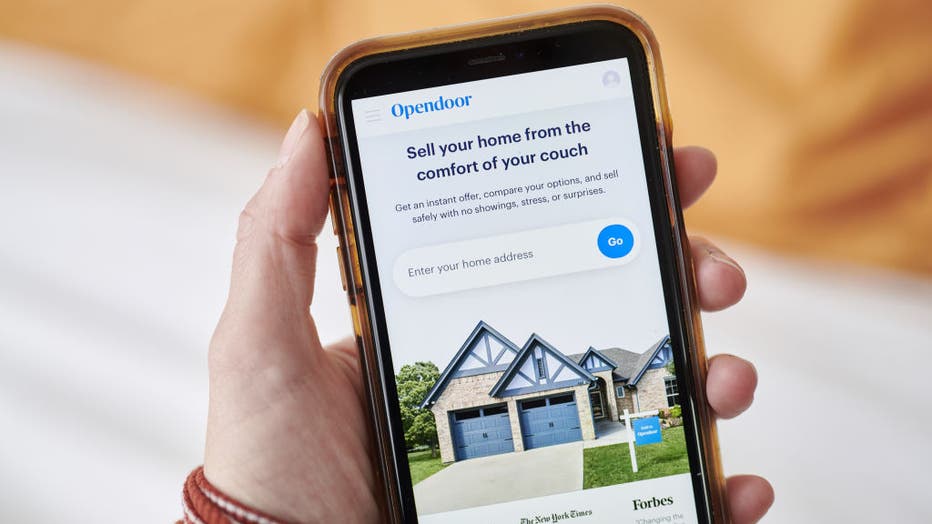Opendoor fined $62M by FTC over 'deceptive' marketing
FTC fines Operdoor for 'deceptive' marketing
The Federal Trade Commission says iBuyer service Opendoor deceived customers into offering their properties to the service for less than they would have made on the open housing market.
ATLANTA - We've all seen the ads: I'll buy your house as is. You can close on your schedule, and you’ll make a lot more money in the end.
Sounds good, right? Well, the Federal Trade Commission found in their investigation, it is too good to be true, and that consumers were being plagued with "deceptive and misleading practices."
FOX 5 real estate expert John Adams joined "Good Day" to explain the good, the bad, and the ugly of the iBuyer program.
Adams says Zillow promise to revolutionize the real estate industry — buying houses "as-is" then fixing them up and selling them. In fact, he says they were doing just that in a lot of major markets, including right here in metro Atlanta.
Then Zillow became a licensed real estate broker, so they could attempt to eliminate commissions where possible and participate whenever they could, but they ran into just one major challenge.
It’s hard work to sell a house, especially in such a way that maximizes the seller proceeds. Zillow promised that, but found that they could not deliver consistently, so they exited the "instant offer" business in October of last year.

The Opendoor Technologies Inc. website on a smartphone arranged in the Brooklyn Borough of New York, U.S., on Thursday, March 4, 2021. (Photographer: Gabby Jones/Bloomberg via Getty Images)
Industry giants Opendoor, RedfinNow and Offerpad continued to use the iBuyer program, promising sellers a quick all cash offer on their house as is with no repairs or expenses.
Some time ago, the Federal Trade Commission began examining the practices of Opendoor. It found that the company, which claims it allows homeowners to sell their homes more quickly than through a traditional real estate broker, deceived customers into offering their properties to Opendoor for less than they would have made on the open market.
The agency said Opendoor had presented home sellers with charts that showed they would make thousands of dollars more by selling their properties on the platform compared with in the traditional marketplace.
The FTC alleged that Opendoor pitched potential sellers using misleading and deceptive information, and in reality, most people who sold to Opendoor made thousands of dollars less than they would have made selling their homes using the traditional process.
"Opendoor promised to revolutionize the real estate market but built its business using old-fashioned deception about how much consumers could earn from selling their homes on the platform," said Samuel Levine, director of the FTC’s Bureau of Consumer Protection. "There is nothing innovative about cheating consumers."
Specifically, the FTC investigation alleged that Opendoor violated the law by misrepresenting that:
- Opendoor used projected market value prices when making offers to buy homes, when in fact those prices included downward adjustments to the market values;
- Opendoor made money from disclosed fees, when in reality it made money by buying low and selling high;
- Sellers likely would have paid the same amount in repair costs whether they sold their home through Opendoor or in traditional sales;
- Sellers likely would have paid less in costs by selling to Opendoor than they would pay in traditional sales.
Opendoor issued a statement:
"Since our founding in 2014, Opendoor set out to drastically simplify the real estate transaction, redefine the housing market, and make buying and selling a home as easy as a tap of a button – bringing transparency, competition and convenience to the antiquated and offline home transaction for consumers. And data shows that our customers value and adopt Opendoor; in fact, we maintain an NPS well over 80 and have maintained a real seller conversion of over 35 percent. While we strongly disagree with the FTC’s allegations, our decision to settle with the Commission will allow us to resolve the matter and focus on helping consumers buy, sell and move with simplicity, certainty and speed.
"Importantly, the allegations raised by the FTC are related to activity that occurred between 2017 and 2019 and target marketing messages the company modified years ago. We are pleased to put this matter behind us and look forward to continuing to provide consumers with a modern real estate experience."
Adams believes that when an educated consumer understands the costs and the benefits of services being offered by any vendor, then the consumer can make a decision in its own interest. In other words, the "invisible hand" of the free market benefits us all.
But that system falls apart when companies employ deceptive trade practices or misrepresent the truth. The crime is especially egregious when applied to home sales, because there is so much money involved in that transaction.
There is nothing inherently wrong or improper with the idea of offering consumers an "iBuyer" real estate service that directly purchases consumers’ homes. However, any vendor who misrepresents the truth in order to increase its profits at the expense of the consumer has committed a crime. The bottom line: shop and compare among reliable vendors to find the best deal for you!
#############################
Atlanta native John Adams has been a real estate broker and investor in residential real estate for the past four decades, and has seen the market go up and down and back up. He hosts "The Real Estate Coffee Break" every Saturday at 11am on the world wide web at www.RealEstateCoffeeBreak.com, where you will find free special reports on BUYING A HOME and SELLING A HOME. John believes that, for most Americans, the best investment they will ever make is their own home.

